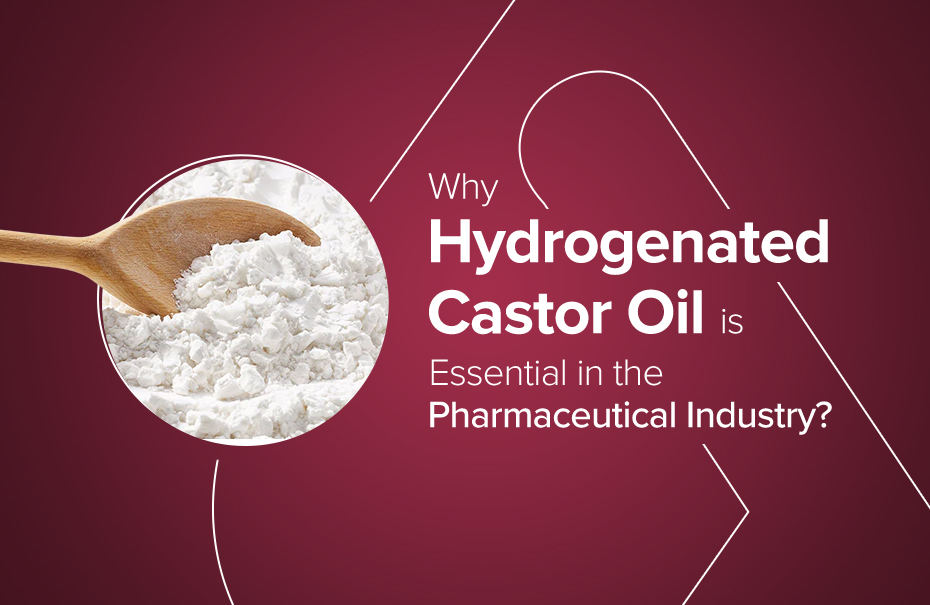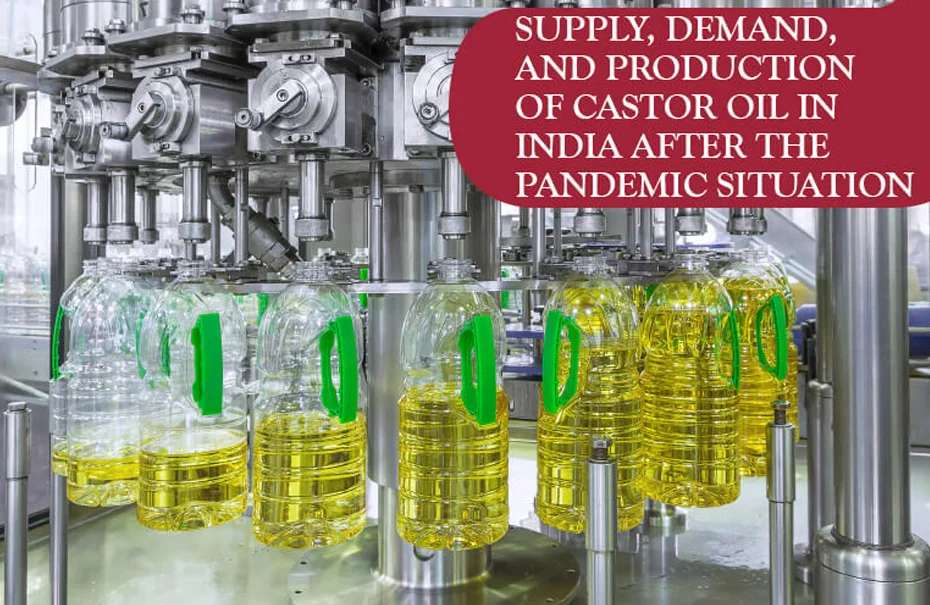Why Hydrogenated Castor Oil is Essential in the Pharmaceutical Industry?

While every element in the pharmaceutical sphere is vital—-hydrogenated castor oil emerges as a silent hero, promising innovation and guaranteeing life-saving medications with its superior healing properties. The hydrogenation of castor oil creates a special derivative– hydrogenated castor oil (HCO). It is a versatile oil with extensive applications in the pharmaceutical industry. The significance of castor oil comes from its role in enhancing drug stability and effectiveness by changing the production process. It is notable that due to its ability to enhance solubility and release rates of active agents, hydrogenated castor oil has become a vital element in the manufacture of various drugs.
The significance of hydrogenated castor oil in pharmaceuticals cannot be overlooked, since it forms part of modern drug delivery systems. Its role in this sector demonstrates how natural products are key for driving advancements in medicine today.
Chemical Characteristics of Hydrogenated Castor Oil
Description of the Process Involved in Hydrogenation
A hydrogenated castor oil manufacturer firm uses the application of pressure on liquid castor oil, making it react with a nickel catalyst. The reaction alters the liquid oil’s molecular structure by producing hydrogenated castor oil, which shows increased stability and different physicochemical properties.
Generalizations on Chemical Structures and Properties
The primary component in the presence of hydrogenated castor oil is the ester form of triglyceride 12-hydroxystearic acid, which has a lower melting point when compared to its liquid form. It significantly changes performance in a variety of applications, especially medical ones.
Physicochemical Properties: Traditional Vs HCO
| Property | Traditional Castor Oil | Hydrogenated Castor Oil |
| Viscosity | Lower | Higher |
| Stability | Less stable | More stable |
| Melting Point | Room Temperature | 83-87 °C |
| Application | Limited | Extensive |
Crucial Role of Hydrogenated Castor Oil in the Pharma Industry:
A large number of pharmaceutical products use hydrogenated castor oil, ranging from topical ointments to oral medications. Its properties offer optimum performance coupled with patient satisfaction, thus making it the formulators’ favorite ingredient.
- An Excipient in Pharmaceutical Formulations: It acts as an excipient in drug formulation or delivery systems, assisting with the solubility and stabilization of active pharmaceutical ingredients. Their formulation gets stabilized by using a thickener/emulsifier such as hydrogenated castor oil.
- Tablet Coating: As a tablet coating material, HCO makes it easy to swallow the tablet. The coating prevents the actual odor of the tablet which can be unpleasant.
- Functionality within Drug Delivery Systems: The system functions as a lubricant/solubilizer when required during manufacturing, such as ointments or emulsions containing hydrogenated castor oil. This aspect ensures effective medication administration where it may require the active ingredient to be absorbed.
- Viscosity Modifier: HCO can be used to adjust the viscosity of liquid and semi-solid pharmaceutical preparations. This property is particularly useful in creating stable suspensions and emulsions.
- Suppository Base: In the production of suppositories, HCO is used as a base material due to its ability to melt at body temperature, allowing for the controlled release of medication.
- Capsule Manufacturing: HCO is used in the production of soft gelatin capsules. It helps in creating a stable shell that protects the encapsulated liquid or semi-solid formulations.
- Advantages in Enhancing Bioavailability: Hydrogenated castor oil enhances the bioavailability of drugs, fruitfully elevating the treatment outcomes for patients. That works wonders in oral formulations, as it makes drugs increasingly stable and soluble in the system.
Benefits in Therapeutic Applications
- Role of HCO in Topical Formulations: Hydrogenated castor oil is popular in topical creams, due to its courtesy of moisturizing properties. It helps to keep the skin hydrated and makes it smooth as a natural emollient.
- Antimicrobial and Anti-Inflammatory Properties: Hydrogenated castor oils possess characteristics that are known to have anti-inflammatory and antimicrobial properties, which are vital in healing different skin diseases. Consequently, you can find it as a component in balms, made for healing or easing wounds.
- Application in Oral Medications and Supplements: It also serves as a lubricant during the tableting and capsule formation processes of drug products that are administered orally. These factors not only enable easier processes but may also improve patients’ experiences with medication administration.
Safety and Regulatory Considerations
Overview of Safety Profiles and Testing Requirements
Hydrogenated castor oil has a safety record that is well established and it is usually seen as non-irritating and non-toxic. Toxicity tests with rats have shown that LD50 is greater than 10g/kg, this indicates a wide safety margin.
Regulatory institutions such as the FDA classify hydrogenated castor oil as an indirect food additive. This enables its inclusion in both pharmaceuticals and food-grade applications ensuring compliance with safety requirements.
One mistaken belief is that all oils are harmful; nevertheless, properly used hydrogenated castor oil can be consumed and applied on the skin safely.
Innovations and Future Trends
Some recent studies have identified other applications for hydrogenated castor oil, particularly in biopharmaceutical (such as drug delivery systems) and bioadhesive formulations. Continuity of such findings indicates more future value within the industry in years ahead.
Technological advances made production processes more efficient and environmentally friendly making them also ecologically responsible. It fits well with the sustainability initiative by the pharmaceutical sector towards sourcing & manufacturing. Hydrogenated Castor Oil manufacturers in India are uptaking sustainable strategies, owing to the increasing demand for green products. This gives an added advantage to Hydrogenated Castor Oil marketability within pharmaceutical Industry.
Conclusion
Hydrogenated castor oil is one of the most integral liquid substances in the pharmaceutical industry. We all now know why— improved stability, solubility, and safety. From acting as a vital excipient in drug formulations to serving as an essential component in tablet coatings, HCO is revolutionizing how we approach pharmaceutical production. In several drug formulations and drug delivery systems, this game-changing product acts as a remarkable excipient, since it’s a more stable form and controls the release of active pharmaceutical ingredients.
Are you ready to unlock the potential of Hydrogenated Castor Oil in your pharmaceutical products? Contact Ambuja Solvex to buy pharmaceutical-grade Hydrogenated Castor Oil now.
The significance of hydrogenated castor oil in drug formulation and delivery will increase further due to the continuous advancements in research and technology. As such, hydrogenated castor oil remains an essential component for creating efficient sustainable drugs, since it’s considered by many pharmaceutical companies in the healthcare sector, looking for a greener option.



